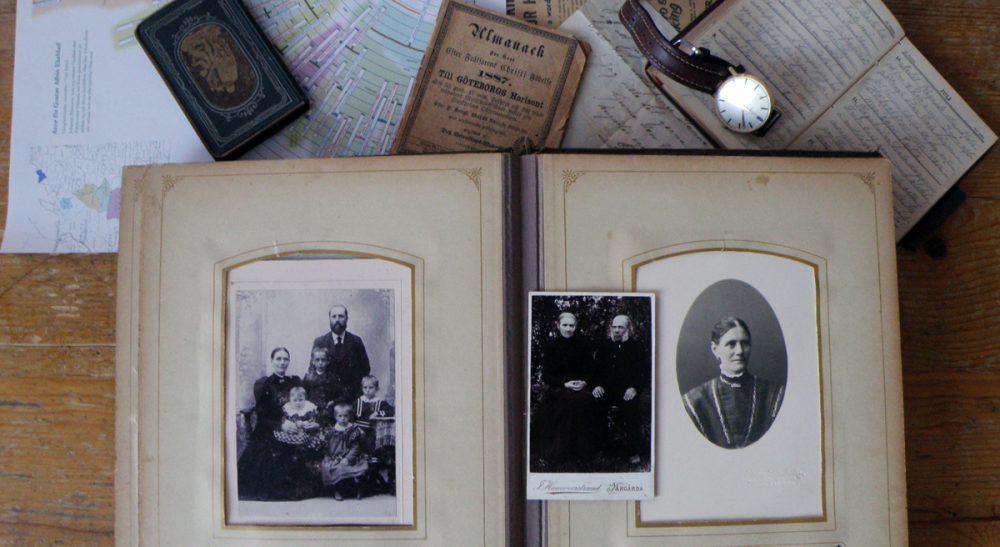Advertisement
The Stories We Tell Ourselves About The People Who Came Before Us

Growing up, I used to tell my family story this way: My grandfather on Mom’s side was a poor immigrant from England who worked his way up from office boy to company president. He made money from real estate and owned part of the Empire State Building. Grandpa was rich but generous; having gone to school only to fourth grade, he cared so much about education, he paid for college for each of his 17 grandchildren.
My grandfather on Dad’s side also started out poor, a hardworking farmer and railway worker. He was killed by a train when he was just 45, plunging his family deeper into poverty. My father helped support the family at age 11, by setting traps for skunks and possums and selling their pelts. He was so good at selling, he grew up to become a sought-after fundraiser for important causes: ending polio and curing cancer.
I loved my family stories, with their satisfying mix of hard work and sacrifice, and their silver-lined endings. Dad would embellish his tales with colorful phrases. He claimed to be part Pennsylvania Dutch, the region’s tourist-attracting ethnic group, and he regaled us with colloquialisms like “outen the light,” and “I was just ferhoodling (fooling) you.”
I relished it all. Until, that is, I discovered that my family lore was largely fiction.
The unraveling began when I read my aunt’s memoir and discovered that my rich grandfather hadn’t been an immigrant; he was born in Connecticut. Yes, his family started out poor, but only because my great-grandfather had been so anti-government that he’d refused his Civil War pension.
Nor was my grandfather as unschooled as I’d been led to believe. He’d earned a business school certificate. And his first job was as an accountant, not office boy. All of this I discovered from a family memoir that I hadn’t previously paid attention to, so content was I with the story I’d been told and retelling since my youth.
I loved my family stories, with their satisfying mix of hard work and sacrifice, and their silver-lined endings... Until, that is, I discovered that my family lore was largely fiction.
As for my paternal, poor-but-hardworking granddad, he was not Pennsylvania Dutch. He did milk cows, and the family was broke after his death, but before that, he’d been boss of cement and railway work crews. His family’s destitution was the result not just of his untimely death, but of his improvidence; he left debts but no life insurance. Once again, the family story I’d been telling for decades turned out to be mostly fiction.
Why was I told heroic sagas instead of the real family facts? Why do any of us lionize our ancestors? Are we all so in love with rags-to-riches narratives that we turn our forebears into archetypes? And what happens when, inevitably, they fall to earth?
Our response may depend on our age. When I was a child, my parents fed me family stories they thought would inspire me. I swallowed them whole. When I first learned the less praiseworthy aspects of those I had been raised to admire, I was a young adult. At my most cynical, I blithely judged everyone as either good or bad.
Advertisement
Then, in my late 40s, Dad revealed, as I was recording his oral history, that his rich-but-generous father-in-law had once engaged in illegal backroom dealing. During World War II, Grandpa had bought up all of Jakarta’s peppercorns that were destined for U.S. markets. He stashed them in Hoboken until the price went up. The government had outlawed the hoarding of basic foodstuffs during war. Grandpa’s scheme was described to me as a smart business strategy, but I knew better: It was wartime profiteering. My shock and disappointment lasted for years.
I’m at last able -- and willing -- to realize that my relatives were complex and contradictory.
The partial fables my family told are not unlike what my country’s early historians told from the start, putting their own male, white and monied class in the best light, while ignoring, skewing or whitewashing everyone else’s history, depending on the group.
It may be because, in my 70s, I’m at last able — and willing — to realize that my relatives were complex and contradictory. As Walt Whitman wrote in “Song of Myself,” “Do I contradict myself? Very well then, I contradict myself. I am large. I contain multitudes.”
Not all of my family prospered because of hard work or were impoverished by oppression. The farmer was both a milker of cows and boss of a railway crew. The pepper-hoarder was both a generous grandfather and a minor war criminal. No longer icons, but men whose real lives trump the fables I once told. As my father would say, “No ferhoodling.”
